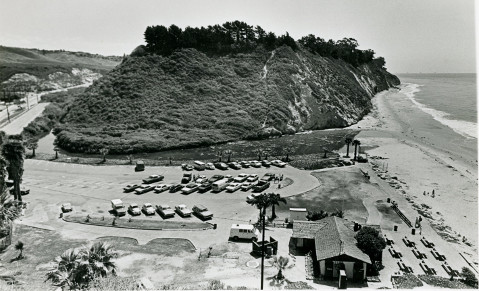The Antecedents of Arroyo Burro Beach
Hendry Family Named a Beach and a Blacksmith's

Although officially known as Arroyo Burro, this stretch of coastline between Hope Ranch and the Douglas Family Preserve has been called Hendry’s Beach for decades. In the late 1800s and early 1900s, William N. Hendry and family farmed in this area.
A native of Scotland, Hendry was 24 when he set sail for the U.S. out of Liverpool in 1872. It was not an easy passage. Rough seas, seasickness, theft, and fights among the crew and passengers were just some of the problems. Tragedy struck when a young girl stopped eating due to illness; she eventually died and was buried at sea.

After a journey of two months, Hendry arrived in Santa Barbara and went to work for Ellwood Cooper on his Goleta Valley ranch. Hendry worked from sunup to sunset, six to seven days a week. Entries in his journal often just read, “Ploughed all day.”
Eventually Hendry saved enough to lease a piece of ground of his own in an area now occupied by UCSB. In 1881, he married Annie Stronach, also a Scottish immigrant, and three years later he leased over 360 acres at Arroyo Burro, which included Veronica Springs and a good portion of Hope Ranch. Hendry primarily grew hay, oats, and barley, selling much of his yield to stables in Santa Barbara. He later diversified, with lima beans becoming an important crop. One year the family earned around $4,000 just from the bean crop alone.
The Hendrys had 12 children, and the latter often invited friends to swim off the beach at the mouth of the creek; gradually the beach became known as Hendry’s to locals. Around the turn of the century, where the Douglas Family Preserve is today, Chinese farmers raised watermelons.
Hendry retired in 1914, and four years later he sold the farm for $80,000, as his children did not follow their father’s footsteps into farming. The family moved into town to a house at 509 Chapala Street.
A number of William and Annie Hendry’s sons had gone into the blacksmith trade. In 1906, son William bought the business of Harry Hawcroft at 20 West Cota Street, moving it to 25 West Cota in 1915. Eventually four brothers worked in the shop: William, Allan, Bruce, and Nicol. Nicol moved on to start his own blacksmith and machine shop. Another brother, Walter, became a carpenter in Santa Barbara.
Hendry Bros. was a fixture in Santa Barbara until the shop closed its doors for good in 1975. During its run of close to 70 years, the firm adapted to the transition from horse and buggy to automobile as it went from making farm tools, brands, and wagon wheels to fashioning auto and truck springs. Ornamental ironwork also became a lucrative specialty. Among their customers were the Loughhead (Lockheed) brothers, founders of the aviation firm.
As for the beach, 30 years of sporadic negotiations with the county came to an end in 1947. For $15,000, Santa Barbara County purchased, with state help, five and a half acres with 500 feet of oceanfront at the mouth of Arroyo Burro Creek for a park. An additional 100 feet of beach was deeded over to the county as a gift. Today, Arroyo Burro County Park, aka, Hendry’s Beach, is one of the most popular beaches on the South Coast.
Michael Redmon, director of research at the Santa Barbara Historical Museum, will answer your questions about Santa Barbara’s history. Write him c/o The Santa Barbara Independent, 122 West Figueroa Street, Santa Barbara, CA 93101.



